You are viewing the Cultures of Knowledge Blog archive for the ‘Front Page’ Category:
James Brown
March 27, 2012
Front Page, Project Updates, Publications, Videos
Tags: Editions, Europe, History of Science, John Wallis, Mathematics, Networks, Seventeenth Century
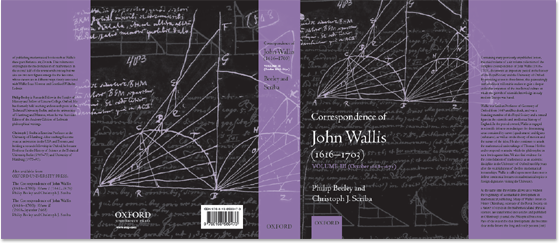
We are pleased to report that Volume III of The Correspondence of John Wallis (1616-1703) – one of a number of epistolary editions the Project is supporting, and the latest installment of the prestigious multi-volume edition of the mathematician’s letters – is now available for pre-order from Oxford University Press, pending publication in May. Painstakingly crafted by our Research Fellow Philip Beeley in conjunction with Christoph J. Scriba, work on the third volume began in the context of the AHRC-funded Wallis Project, and has been completed under the auspices of Cultures of Knowledge.
Consisting of 254 letters in total, the volume covers the exciting period 1668 to 1671, during which England was at peace with itself and its neighbours, publication techniques were becoming ever-more sophisticated (especially with the emergence of academic journals), and scientific activity thrived across the continent. It finds Wallis embroiled in fascinating debates on techniques for determining areas contained by curves (quadratures) and figures (cubatures), as well as on theories of motion and the nature of tides. Other volume highlights include Wallis’s celebrated disputes with Thomas Hobbes and French mathematician François Dulaurens, and ceremonial visits to Oxford by the Crown Prince of Tuscany and William of Orange, during which – in telling evidence of rapid disciplinary consolidation – Wallis presented the visiting dignitaries with examples of state-of-the-art geometrical thinking. Below, Philip discusses the latest installment and looks ahead to Volume IV, which will be delivered in the summer.
For further publication details and to pre-order your copy, please visit the OUP website. For background information about Wallis and other outputs emerging from this sub-project (including podcasts, video, and a complete catalogue of Wallis’s extensive correspondence within Early Modern Letters Online), head along to the Wallis webpage.
James Brown
January 30, 2012
Events, Front Page, Project Updates, Videos
Tags: CKCC, Databases, Digitization, Geography, Mapping the Republic of Letters, Networks, Spatial Theory, Union Catalogue, Union Catalogue News, Visualization

Videos of twenty-one papers and keynotes from our 2011 conference Intellectual Geography: Comparative Studies, 1550-1700 (Oxford, 5-7 September 2011) are now available on the conference website or via our Vimeo channel (with more hopefully to come). Organised by Howard Hotson, the event introduced and tested the novel concept of ‘intellectual geography’ as a means of appreciating and understanding the organisation of intellectual activity and the dissemination of ideas within space and across time, from the sixteenth to the eighteenth centuries. A taster – Miles Ogborn‘s keynote exploration of ‘What is Intellectual Geography?’ – is provided below. Happy viewing!
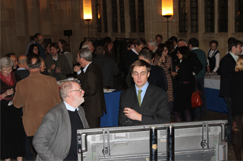
EMLO screenshots captivate the crowd.
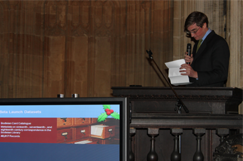
Chris Fletcher sets the scene.
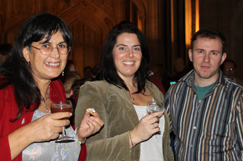
Festive designers and programmers.
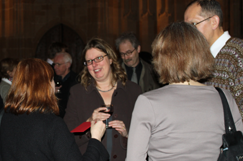
The Lister and Lhwyd research teams.
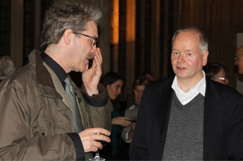
Stephen Clucas and Philip Beeley.
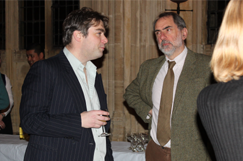
Will Poole and Richard Sharpe.
After a very busy year in private alpha, the Project celebrated the imminent public beta launch of our free union catalogue – Early Modern Letters Online − with a festive reception last Friday. Over eighty students, scholars, librarians, and digital humanists joined us in the historic environment of the Bodleian Library‘s Divinity School, where – over mulled wine, seasonal canapés, and mince pies – they were treated to contextual remarks from Dr Chris Fletcher (Keeper of Special Collections) and Professor Howard Hotson (Director of Cofk), and a full demonstration of the capabilities of the catalogue’s search and discovery, and editorial, interfaces by Project Coordinator Dr James Brown. Many thanks to everyone who contributed to the success of the evening, with a special shout-out to the Bodleian’s Wilma Minty for arranging things with her usual flair.
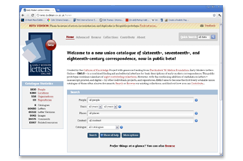
The EMLO homepage.
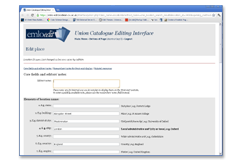
EMLO Edit, the editorial interface.
Early Modern Letters Online – which currently contains 60,480 epistolary records – federates basic metadata from eight contributing sources (including 48,695 sixteenth-, seventeenth-, and eighteenth-century records drawn from the existing card index of correspondence in the Bodleian Library), and allows for their manipulation and further enhancement by means of a sophisticated editorial environment. It will be available to the public from early January 2012.

 To stay informed, please watch this space or join the Mailing List. In the meantime, we wish you all a very Happy Holidays!
To stay informed, please watch this space or join the Mailing List. In the meantime, we wish you all a very Happy Holidays!
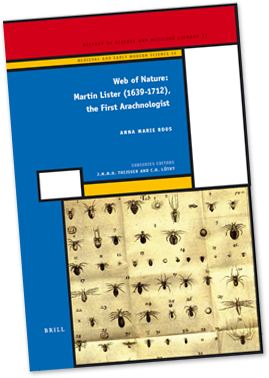 Update: see photos of the launch
Update: see photos of the launch
We are delighted to announce the publication of a monograph by our Martin Lister Research Fellow Dr Anna Marie Roos. Web of Nature: Martin Lister (1639-1712), the First Arachnologist (Brill, 2011) is the first and only full-length biography of the prominent naturalist and physician. Drawing on rich archival sources (including over 1,100 surviving letters, which Roos is also editing under the auspices of the Project), Roos provides a detailed picture of what it meant to be a virtuoso in the seventeenth-century Republic of Letters. Lister, described by Robert Boyle as a researcher of ‘piercing sagacity’, discovered ballooning spiders, while his work on molluscs was standard for 200 years. However, he also invented the histogram, provided Sir Isaac Newton with chemical procedures and alloys for his telescopic mirrors, demonstrated that York’s walls were Roman, received the first reports of Chinese smallpox vaccination, donated the first significant natural history collections to the Ashmolean Museum, and was involved in the day-to-day administration of the Royal Society in its formative years. His study of natural history represents a conceptual bridge between the work of Renaissance naturalists and those of the Enlightenment, while the impact of his research extended into Jamaica, America, Barbados, France, Italy, the Netherlands, China, as well as his native England. Roos also disentangles the significant webs of knowledge, patronage, familial, and gender relationships that shaped Lister’s life as a natural philosopher, presenting a humanistic and holistic view of early science. For more information about the book, please visit the publisher website or download the flyer (pdf).
Update: Preview some preliminary results
We are fortunate to have with us this week Scott Weingart, a former student of Robert A. Hatch and an up-and-coming visualization expert from Indiana University‘s Cyberinfrastructure for Network Science Center. Following on from a workshop at Mapping the Republic of Letters (Stanford) and a three-month stint at CKCC (Huygens Institute), Scott will be spending time with our union catalogue development team at BDLSS, raising awareness of the various techniques and technologies available for representing and visualizing large epistolary datasets. Scott kicked off his stay with a well-attended presentation on ‘Analyzing, Visualizing, and Navigating the Republic of Letters’ on Monday 11 July. In a two-part discussion, Scott provided a general introduction to the many uses and histories of visualizations, before describing in detail the various software packages and data formats necessary for implementation. Both of Scott’s talks can be watched again below; you can also ‘click along’ with his slides.
Part I: Introduction
Part II: Implementation
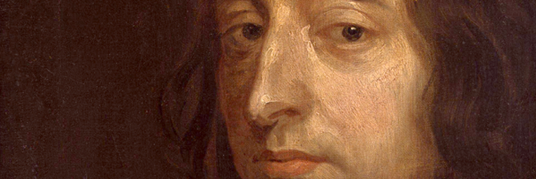
The Project is delighted to announce the presentation of transcriptions of almost all of the surviving correspondence of the jurist, historian, Hebraist, and polymath John Selden (1584–1654). The transcriptions have been generously provided by Professor Gerald J. Toomer, who prepared them (originally for his own research purposes, not for publication) in the course of the research for his magnum opus John Selden: A Life in Scholarship (Oxford: Oxford University Press, 2009). Selden, many of whose letters survive among the holdings of the Bodleian Library, was widely regarded as the most important scholar in Britain in the seventeenth century. He was a major antiquary and historian of English law, whose work was unrivalled before Maitland in the nineteenth century. He was also a central figure in the transmission of Oriental learning to the West, and was acknowledged in his lifetime as one of the greatest Christian authorities on Jewish law and history. He encouraged the study of Arabic, and produced the first English edition of an Arabic text. He was also an internationally recognised theorist of international law (in his Mare Clausum) and natural law (De Iure Naturali et Gentium). His works were caught up in many of the most controversial religious and political issues of the day, provoking praise and polemic in Britain and Europe. His correspondence network extended to northern Europe and eastwards to Aleppo.
The discussions which led to Professor Toomer’s generous agreement to the presentation of these transcriptions on our website were initiated at and facilitated by the international conference John Selden, 1584-1654: Scholarship in Context (Magdalen College, Oxford, 24-26 June 2010), organized by Thomas Roebuck and Jeffrey Miller in association with the Centre for Early Modern Studies and the Centre for the Study of the Book.
The transcriptions will be available in a fully searchable form within our union catalogue at its launch in September 2011. In the interim, we are pleased to be able to provide them as a pdf file (13.5 MB).
Please note that the copyright of the transcriptions remains with Professor Toomer, and that you should not quote from them in papers or scholarly publications without prior written permission (please contact the Project in the first instance). Professor Toomer would also like it to be emphasised that the document is not a conventional scholarly edition, and should not be judged by those standards; the transcriptions were prepared for private use rather than for publication, and in most cases have not been checked against the originals.












 To stay informed, please
To stay informed, please 


 Join
Join 